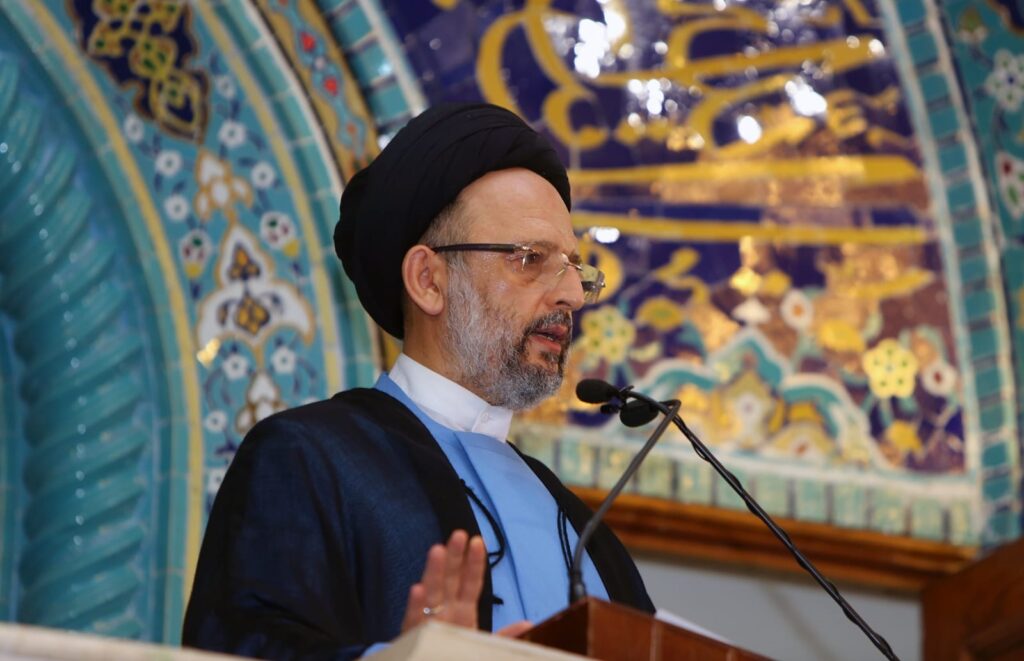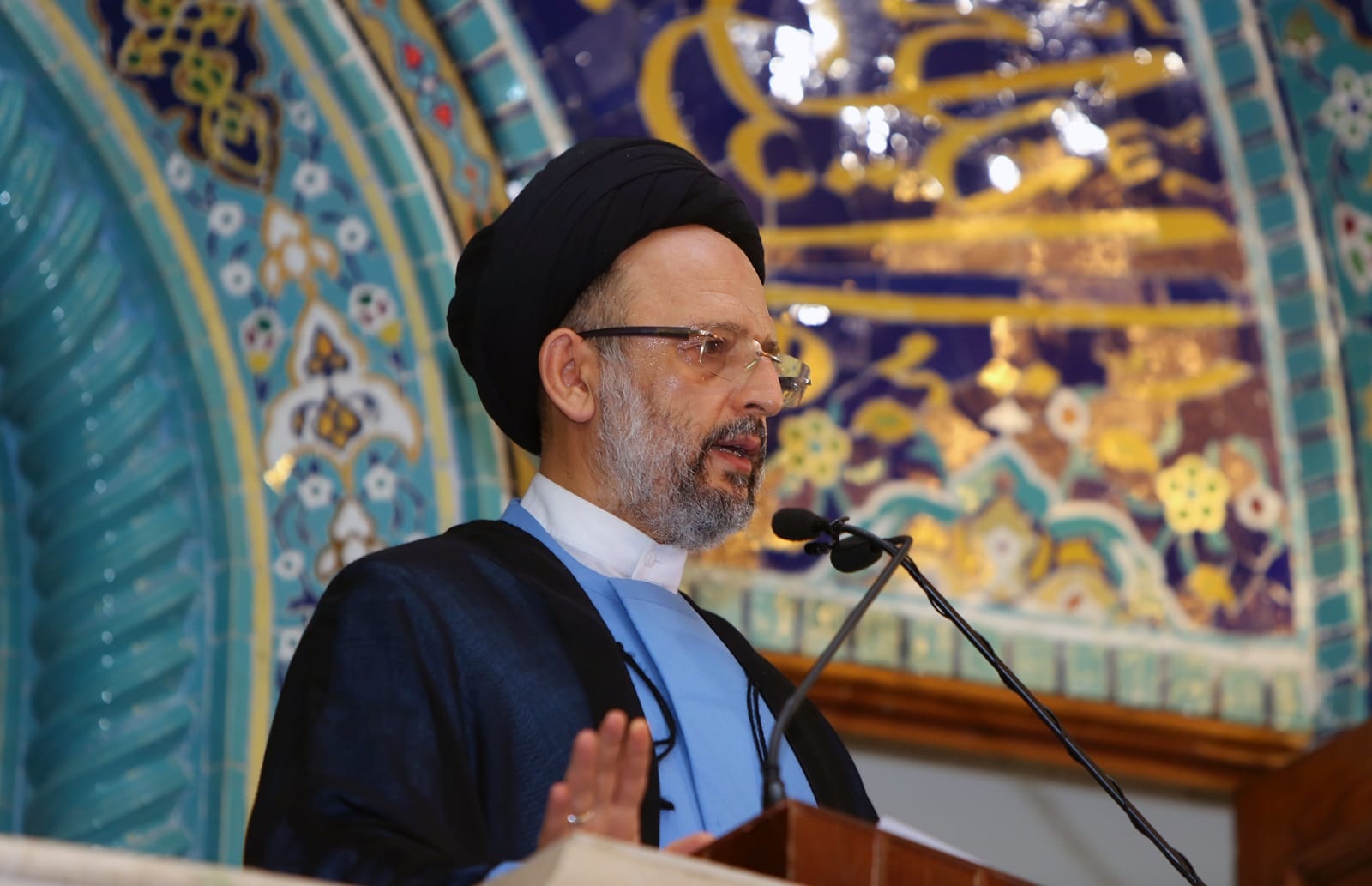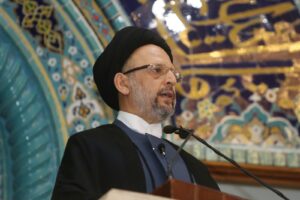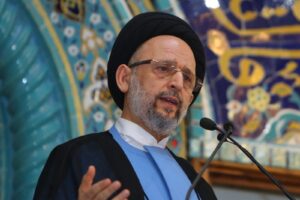In The Name of Allah, The Compassionate, The Merciful
.
His Eminence, Sayyed Ali Fadlallah, delivered the two Friday prayer sermons at the Imamain Al-Hassanain Mosque, Muharram 13, 1446/July 19, 2024. Several prominent religious scholars, dignitaries, and hundreds of believers attended the Jumu’a prayer. Following is a summary of the sermons.
The First Sermon
Allah, the Most Exalted, says in His Glorious Book:
“This is the good news that Allah gives to His servants who believe and do righteous deeds. Say, ‘I do not ask you for it any reward except love for my near relatives.’ And whoever earns good, We increase for him good therein. Indeed, Allah is Forgiving and Appreciative.” Allah, the Most Exalted, says the truth.
This verse was revealed to the Messenger of God (p.) to announce to the Muslims what he wants as a reward from them for his efforts towards them. He brought them from darkness to light, ignorance to knowledge, and division to unity, making them the best nation brought forth for people. The reward is love for the near relatives.
This announcement prompts us to question: Is it conceivable that the Messenger of God , who transcended all familial and tribal considerations in his mission, would call people to love his relatives just because they are his kin, even if they opposed his message?
This does not align with what Ali(a.s.) , the closest to him, said: “The ally of Muhammad is he who obeys God, even if distant in kinship, and the enemy of Muhammad is he who disobeys God, even if close in kinship.”
We saw him disavow Abu Lahab, his uncle, for his disbelief, while he brought Salman the Persian close to him, saying: “Salman is from us, Ahl al-Bayt.”
He advocated God’s words: “You will not find a people who believe in Allah and the Last Day loving those who oppose Allah and His Messenger, even if they were their fathers, sons, brothers, or clan. Those—He has decreed faith in their hearts.” And he said: “A man will not have complete faith in God until God is dearer to him than himself, his father, his mother, his wealth, and all people.”
Therefore, the Prophet was not calling people to love his relatives because they were his kin but rather those distinguished by traits qualifying them for this affection. Those are the ones God purified from uncleanliness, as mentioned in the verse: “Indeed, Allah desires to remove impurity from you, O people of the [Prophet’s] household, and to purify you completely.”
The Prophet (p.) pointed to them as a safeguard against misguidance, saying: “I leave among you two things, if you hold fast to them, you will never go astray after me: the Book of God and my family.”
Dear loved ones, we are invited to follow what the Messenger of God called for regarding love for his near relatives. This love, made obligatory by God, is not just emotional or sentimental. God explained its meaning: “Say, ‘If you love Allah, then follow me, Allah will love you and forgive you your sins. Allah is Forgiving and Merciful.'”
The Prophet and the Ahl al-Bayt emphasized this by saying to their followers: “Love us as part of Islam.” Their love is complete only through loving what they stood for. Imam al-Baqir (a.s.) clearly expressed this to Jabir, one of his companions: “Is it enough for one who claims to be our Shia to say he loves us, Ahl al-Bayt? By God, our Shia are only those who fear God and obey Him. They were known for humility, devotion, trustworthiness, frequent remembrance of God, fasting, prayer, kindness to parents, caring for neighbors, the needy, debtors, orphans, truthfulness, recitation of the Quran, and restraining their tongues from speaking ill.“
Jabir said: “O son of the Messenger of God, we do not know anyone with these qualities.” The Imam replied: “Do not let ideas take you away. Is it enough for a man to say, ‘I love Ali and align with him,’ without action? If someone says, ‘I love the Messenger of God,’ then the Messenger is better than Ali, and does not follow his teachings or Sunna, his love is of no use.”
Ahl al-Bayt did not want people to connect with them personally or love them for their identities. Instead, they wanted people to adhere to their principles, actions, worship, struggle, and good character. They represented true Islam and rejected those who wanted to love them without action…
Therefore, Ahl al-Bayt desired people to connect to their principles and behaviors, for they did not separate love from action and righteousness.
This affection is what we should express in our relationship with Hussein especially after spending days and nights commemorating his memory, expressing our emotions and sentiments towards him.
Our expression of affection for Hussein (a.s.) and those with him should not stop at wearing black, holding gatherings, shedding tears, lamenting, chest beating, and serving food. While these acts are meaningful and appreciated, they must be complemented by working towards the goals for which they sacrificed dearly. We should embrace the objectives they upheld, which Hussein articulated: “I did not rise for the sake of exuberance, arrogance, corruption, or oppression, but to reform the nation of my grandfather. I want to enjoin good and forbid evil.” He also said: “Whoever sees a tyrant ruler, violating God’s sanctity, breaking God’s covenant, opposing the Sunnah of the Messenger of God, and acting with sin and aggression towards God’s servants, and does not oppose him with action or words, it is incumbent upon God to place him where He does.”
Al-Hussein stated: “These people have adhered to the obedience of Satan and abandoned the obedience of the Merciful, they have spread corruption, suspended divine laws, appropriated public wealth, permitted what God prohibited, and prohibited what God permitted.”…
We should not compromise or negotiate our principles and faith. When someone tries to bargain with us on our free decisions, rights, justice, and moral values, we must say as he did: “No, by God, I will not give you in submission like a humiliated person, nor will I flee like slaves.”
To love Hussein is to be among those who enjoin good, forbid evil, seek reform, confront corruption, and oppose the usurpation of public wealth. We should stand with truth and justice, willing to make sacrifices and pay any price. We should be truthful like the companions of Hussein, who were with him in Karbala, loyal as they did not abandon him during those difficult times. He allowed them on the eve of Ashura to leave when it became clear that the battle was imminent. He said, “This night has covered you; use it as a camel. Let each man take the hand of a member of my family and disperse in the darkness of this night, leaving me with these people, for they seek no one but me.” Yet their response was unanimous: “May God never show us that day. We will sacrifice ourselves, our wealth, and our families for you, and fight alongside you.”
Dear ones, we need to be among those who are sincere in their affection, transforming their love into actions that reform what has decayed in matters of religion and at the societal and state levels. By doing so, we remain loyal to Ahl al-Bayt and show them affection. Let us be as they advised: “Be an adornment for us, and do not be a disgrace upon us.”
The second sermon
Worshippers of Allah, I advise you and myself with
the words of Imam Hussein (a.s.) to his son, Imam Zain al-Abidin (a.s.), before his martyrdom. This advice is for all of us: “O my son, beware of oppressing anyone who has no supporter against you except God.”
Imam Hussain wanted through this advice that no individual or group should exploit their power, position, or authority to oppress those who are weaker in power, position, or rank. Thus, a leader should not oppress their subordinates, a manager their employees, an employer their workers, a teacher their students, nor a husband his wife, or a father his children. This is one of the most grievous forms of oppression, especially when one stands before God, and they will not be spared from His punishment. God has promised to be the supporter of the oppressed and suffering.
By adhering to this advice, we express our love, loyalty, and devotion to Hussain (a.s.). This way, we build a society where no one is wronged due to their weakness or lack of capabilities, and those who have no protector are not oppressed. In doing so, we remain under God’s watchful eye and are more capable of facing challenges.
Starting with Gaza, where the war has entered its tenth month, there are no signs of success in the negotiations taking place in Doha, despite the flexibility shown by the Palestinian negotiator. This is due to the insistence of the Enemy Prime Minister on stalling the talks, wanting them to meet his conditions and achieve his and his entity’s goals in this war. It has become clear how the consequences of his stubbornness could affect not just Gaza but the entire region, potentially leading to an uncalculated war.
Meanwhile, the Palestinian people, along with those who support them in this struggle, continue to resist this entity that uses all forms of destruction, starvation, and thirst to achieve its goals, but without success. This is evident in the state of attrition affecting the occupying army in terms of soldiers and equipment, acknowledged even by its leaders, leading to deep divisions within this entity.
We feel proud of the steadfastness of these people and the sacrifices they make during this period, making them an icon in the world and a model to be emulated. They have become a force not just for Palestine but for the entire Arab and Islamic world.
We salute all those who have not left these people alone in their struggle, driven by their national, religious, and humanitarian sense, despite being aware of the size of the sacrifices they are making. They are disrupting the enemy’s plans and threatening its largest settlements and military bases, which will eventually force this enemy to rethink its calculations and halt its crimes.
We also address the recent decision by the Knesset to reject the Palestinian state within the discussed borders, i.e., the 1967 lines. Of course, this does not fulfill the aspirations of the Palestinian people nor restore their rights. In the enemy’s calculations, the right of return is rejected, and the options for these people, according to the entity, are either displacement or assimilation within it. This is a response to all those who still bet on peace with this entity and normalization in exchange for establishing a Palestinian state, despite only achieving failure and having made significant concessions to the enemy.
This Zionist stance reaffirms what has become clear: there is no option with this enemy but to resist it, as this is the language it understands and will make it return the rights to the Palestinian people.
Therefore, we renew our call for factions, forces, and figures within the Palestinian arena to unite in the face of what threatens them, which has always threatened them all. The Zionist enemy does not differentiate between one faction and another, or between Ramallah, Gaza, the West Bank, or others. It seeks to annihilate the entire Palestinian cause.
It is regrettable to see some within the Palestinian interior still betting on peace with this enemy and exchanging deals with it, or directing their arrows at the resisting factions instead of standing with them against the Zionist enemy, which remains the cause of what happened and is happening.
We reach Lebanon, where Israeli aggression on border villages escalates, continuing its policy of assassinations of resistance leaders and figures in all their locations, and persists in targeting civilians. Meanwhile, the resistance continues its role as planned, and in response to the aggression, dealing with it on the basis of an eye for an eye and a tooth for a tooth. Every day, it teaches a lesson that Lebanon will not be an easy bite for it, and that it must think long before undertaking any venture in this country.
We renew our call for the Lebanese to take pride in having in this country those who can deter this enemy. We call for strengthening this resistance and not throwing arrows at it. If there is a difference in views on what is happening, let us provide a suitable atmosphere for dialogue and appropriate frameworks for it so that the enemy does not exploit any internal gaps that might help it violate this country’s sovereignty and aggression against it.
At the same time, we call on various political forces to lighten conditions and counter-conditions and begin a dialogue that has become necessary to remove concerns, bring positions closer, elect a president, and avert the looming great collapse we witness on all levels, ceasing unrealistic bets on external developments, and making the wager on the unity of the Lebanese and their cooperation to overcome the crisis.
—





